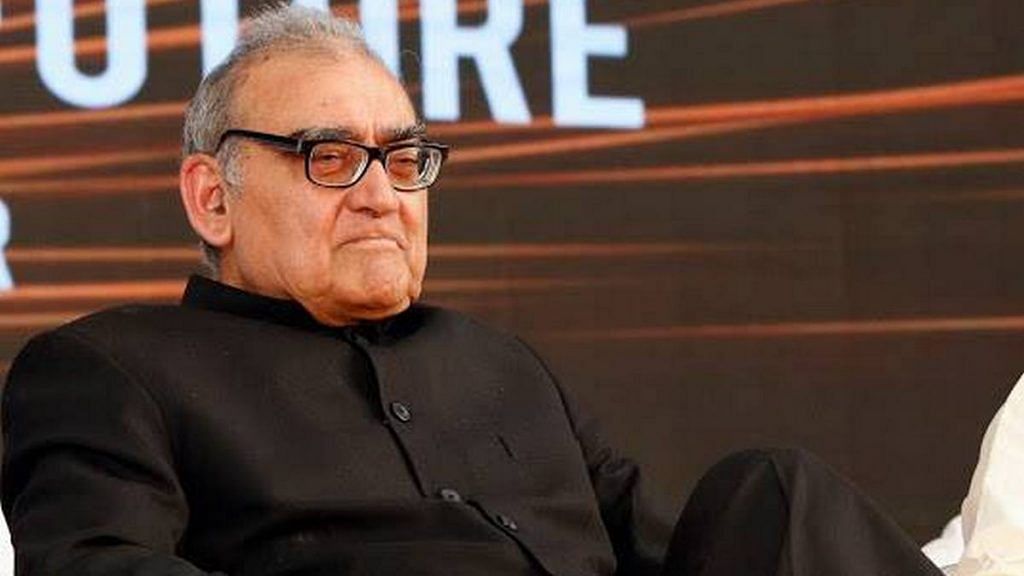New Delhi: Ordering the extradition of fugitive diamantaire Nirav Modi Thursday, the District Judge at Westminster Magistrates’ Court in London, Sam Goozee, made damning remarks against former Supreme Court judge Markandey Katju and his expert testimony.
Katju had last year appeared in the Westminster Court as an expert witness, claiming that Nirav Modi won’t receive a fair trial in India. The UK court, however, asserted that “there is no cogent or reliable evidence that the judiciary in India are no longer independent, or capable of managing a fair trial even where it is a high-profile fraud with significant media interest”.
It then allowed India’s extradition request against Nirav Modi, who is wanted in connection with the Rs 13,758-crore Punjab National Bank fraud, ruling that a prima facie case had been made out.
In doing so, the court called out Katju on certain comments that he made during his cross examination, calling them “astonishing, inappropriate and grossly insensitive comparisons”.
“He (Katju) states that because BJP cannot solve the economic crises it is just like “Hitler and the Jews”, the judgment said.
“Nirav Modi is the Jew that must be blamed for all the problems in India,” Katju is understood to have said, asserting that the Indian government is trying to make Nirav Modi a “scapegoat for causing financial crisis in India”.
‘Outspoken critic with own personal agenda’
The court asserted that despite having been a former Supreme Court judge, Katju’s evidence was “less than objective and reliable”.
“His evidence in Court appeared tinged with resentment towards former senior judicial colleagues. It had hallmarks of an outspoken critic with his own personal agenda,” it added.
Katju was also critical of the former Chief Justice of India Ranjan Gogoi, saying he was “rewarded as a quid pro quo by being nominated as a member of Parliament after retirement”.
However, in response to this allegation, the UK court pointed out that Katju himself had also accepted a post-retirement assignment by the government as the chairman of the Press Council of India.
“Of note, despite being critical of a former Chief Justice passing a verdict in a Supreme Court case in exchange for a nomination to the upper house of Parliament in India on his retirement on a quid pro quo basis, suggesting collusion and corruption, Justice Katju himself secured appointment by the Government to Chairman of the Press Council of India following his own retirement,” the judgment said.
Also read: The Nirav Modi case has played out before in this book
‘Untrue and uncalled for’
Katju called some of the observations by the UK judge “untrue and uncalled for”.
“I have read some extracts of the judgment. The judge was of course entitled to his opinion. But saying that I have my personal agenda was absolutely untrue and uncalled for,” he said in an email response to ThePrint.
“Unlike Justice Thipsay, I am not and have never been, and never intend to be, a member of any political party,” Katju added, referring to former Bombay High Court judge Abhay Thipsay, now a member of the Congress, who also appeared as an expert witness for Nirav Modi.
The UK court was also critical of Thipsay’s evidence, noting that he “is a retired judge who has aligned himself with a political party on his retirement and received adverse commentary in the media”, but “he also engaged and courted with the media himself”.
Katju asserted that the UK judge had not said anything about the extensive material he gave to bolster his submissions and seems to have “just glossed over it”.
“Moreover, even assuming I have an agenda, he has not said anything about the extensive material I gave (including the opinion of other retired Indian judges, which is the same as mine) to show that the Indian judiciary has largely surrendered before the government (see my article ‘All the times the Supreme Court turned a Nelson’s eye to injustice’ published in thewire.in), but has just glossed over it,” he wrote.
Also read: 4 ‘Bad Boy Billionaires’ & where to find them — What Netflix’s controversial show reveals
‘Over 50% of all judges are corrupt’
During the hearing, the UK court received evidence from Katju through a live link from India last year.
In his evidence, Katju alleged that the “highest echelons of the Indian judiciary have now come under significant political and executive influence”.
He also said the Supreme Court has “practically surrendered before the Indian Government and is doing its bidding and is not acting as an independent organ of the state protecting the rights of the people as it was supposed to be” and that the “Indian judiciary has largely surrendered before the political executive”.
When asked whether the problem was restricted to the higher courts in India, Katju alleged that a “large number of judges at all levels have become corrupt”. He spoke about corrupt CJIs as well, saying, “In last decade – many more chief justices have come and gone and it was known they were corrupt. That is my evidence, that is true. I am an insider – 20 years a judge – I know the workings … Over 50% of all judges are corrupt – this is my guess.”
The UK judge, however, said that despite being highly critical of trial by media, Katju “took the astonishing decision to brief journalists in relation to the evidence he was giving in these proceedings, creating his own media storm and adding to the heightened media interest to date”.
Also read: ED brings back jewels worth Rs 1,350 cr owned by Nirav Modi, Mehul Choksi from Hong Kong
